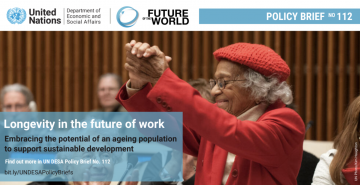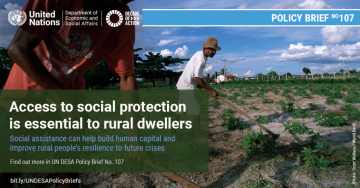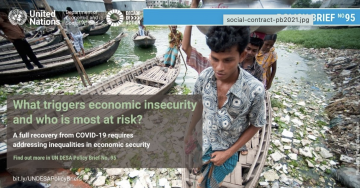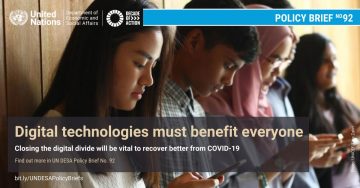Publications
Displaying 1 - 10 of 18
Policy Briefs |
Emergence of new forms of work
‘Standard employment’—understood as regular, full-time, and subject to labour law—remains the prevailing form of employment in high-income countries, however, new forms of employment have been rapidly gaining ground since the early 2000s. While new forms of work enabled by digital technologies have rapidly been expanding in more advanced economies, they are also spreading to emerging economies, where the effects on the labour markets are likely to be different. For instance, studies show that platform work, one of the new forms of work, has the potential to increase employment opportunities, promote formalization, and reduce gender gaps in emerging economies…
Policy Briefs |
Ongoing and emerging global trends, such as globalization, new technologies, the rise in global inequality, demographic shifts, climate change and threats generated by the ongoing COVID-19 pandemic, will dramatically impact societies and individuals of all ages, and will determine the nature and future of work.
At a time of persistent inequalities, an inclusive future of work is fundamental for sustainable development, ending poverty and leaving no one behind. Population ageing influences economic growth and labour force participation, and the share of persons aged 65 years and over in the labour force at the global level is estimated to continue the current upward trend in the…
Policy Briefs |
Why should we care about trust?
Trust is integral to the functioning of any society. Trust in each other, in our public institutions and in our leaders are all essential ingredients for social and economic progress, allowing people to cooperate with and express solidarity for one another. It allows public bodies to plan and execute policies and deliver services. Greater public trust has been found to improve compliance in regulations and tax collections, even respect for property rights. It also gives confidence to consumers and investors, crucial to creating jobs and the functioning of economies more broadly. Success in achieving each of the Sustainable Development Goals (SDGs)—from…
Policy Briefs |
Introduction
Extreme poverty is mainly a rural phenomenon. Four of every five people below the $1.90-a-day international income poverty line lived in rural areas in 2013 (Castañeda and others, 2018). Over the last decades, however, there has been tremendous progress in reducing rural poverty, partly as a result of successful policies promoting economic opportunities for the rural poor and expanding social protection in rural areas.
This progress has not been equitable across the board. The same economic forces that reduce poverty, including rural development and urbanization, can increase inequalities. Moreover, poverty is now rising due to the COVID-19 crisis. All evidence points to…
Policy Briefs |
Introduction
Even though rural poverty has declined rapidly in recent decades, poverty remains primarily a rural phenomenon and the poorest in rural areas are at risk of being left behind. The World Social Report 2021 (United Nations, 2021) finds that successes in poverty reduction have not always led to lower rural inequalities or to a closing of the rural-urban divide. Indeed, disparities in access to basic services and opportunities continue to exist within rural areas and between rural and urban areas, and can be persistently high for specific population groups, such as indigenous peoples and women. The COVID-19 pandemic has further exacerbated the precarious situation of the rural…
Policy Briefs |
The COVID-19 pandemic and the measures needed to contain its spread have had a devastating impact on the world of work. According to ILO’s latest estimates, the crisis resulted in an unprecedented global loss of 8.8 per cent of working hours, equivalent to 255 million full-time jobs, in 2020 (ILO, 2021). While some workers joined the ranks of the unemployed and are still seeking work, many more have left the labour force altogether. Women, youth and workers in low-skilled jobs, often in the informal economy, have been hit harder than other groups. The longer the distress in labour markets persists, the more the affected workers, their families and their communities run the risk of being…
Policy Briefs |
Introduction
With the onset of the COVID-19 pandemic, many have found themselves and their families on shaky economic ground. There are significant inequalities in the degree to which different people have faced exposure, vulnerabilities and the capacity to respond to COVID-19- related shocks, due in part to substantial differences in their experience of economic risk. Such preexisting inequalities have highlighted the extent to which large-scale crises have an uneven impact on the economic security of households and individuals.
Inequalities in education, health and employment result in some groups being more economically insecure than others. Evidence from the United States and Europe,…
Policy Briefs |
Measured by the usual metrics of cases and deaths, Africa’s experience of the COVID-19 pandemic seems mild, but the social and economic impacts of the crisis have hit hard. Across the continent, an estimated equivalent of 60 million full-time jobs were lost in the second quarter of 2020 and up to an additional 40 million people were pushed into extreme poverty by the end of 2020.
“The United Nations, and I personally, stand in total solidarity with the people and governments of Africa, and with the African Union, in tackling COVID-19,” said UN Secretary-General António Guterres. “Global solidarity with Africa is an imperative – now, and for recovering better.”
In its newly released…
Policy Briefs |
COVID-19 is accelerating the pace of digital transformation: implications for social inclusion
Successive lockdowns and confinement measures put in place by governments to curb the spread of COVID-19 are accelerating the pace of digital transformation as information and communications technology (ICTs) are used to sustain daily lives and support business continuity. Recent forecasts expect the number of employees working remotely globally is set to double in 2021 (Chavez-Dreyfuss, 2020). Internet traffic has surged, as individuals are increasingly moving online to work, communicate, socialise, consume and seek entertainment (OECD, 2020). Companies and industries have also been adapting to…
UN ECOSOC Reports on Social Development |
 Welcome to the United Nations
Welcome to the United Nations








